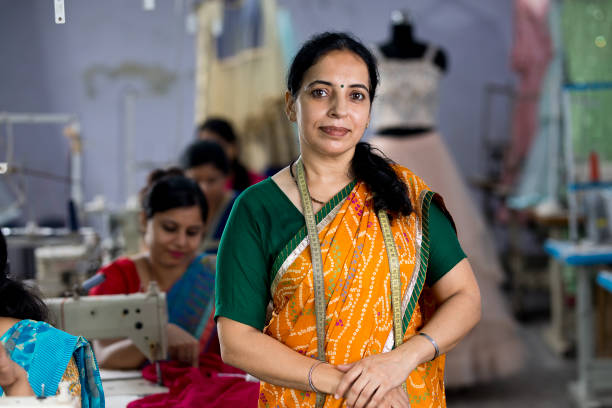In this blog, we will explore the world of women entrepreneurs in India, delving into their current status, the hurdles they face, the initiatives aimed at empowering them, and future prospects that can pave the way for more women-led enterprises. By the end, you will understand why enhancing women’s participation in entrepreneurship is not just a matter of gender equality but also a strategic imperative for economic and diplomatic growth.

In This Post
ToggleDefining the Term 'Entrepreneur'
- An entrepreneur is an individual who identifies a need in the market and creates a business to fulfill that need. Entrepreneurs are known for their risk-taking abilities, innovation, and problem-solving skills. They bring new products or services to the market, often disrupting existing industries and creating new ones.
- Entrepreneurs come in various forms, including social entrepreneurs, who focus on solving social problems; tech entrepreneurs, who innovate in the technology sector; and business entrepreneurs, who create traditional businesses. Regardless of their focus, entrepreneurs are essential for driving economic growth, creating jobs, and improving the quality of life in their communities.
Current Ratio of Women Entrepreneurs in India
- The landscape of women entrepreneurs in India has seen significant growth, yet it remains far from equitable. According to the Global Entrepreneurship Monitor (GEM) Report 2023, the Total Entrepreneurial Activity (TEA) rate for women in India stands at around 14%, which, although improving, still lags behind many other countries.
- NITI Aayog’s Women Entrepreneurship Platform (WEP) estimates that women constitute about 13.76% of the total entrepreneurs in India, with 8.05 million women entrepreneurs out of the total 58.5 million entrepreneurs. The World Bank’s Women, Business, and the Law 2022 report highlights that only 20% of MSMEs (Micro, Small, and Medium Enterprises) in India are owned by women, showing the gap in female participation in entrepreneurship.
- Comparison with Global Statistics:While countries like the United States have a higher ratio of women entrepreneurs (around 36% according to GEM), India’s percentage, though growing, highlights the need for more focused interventions.

Major Issues Faced by Women Entrepreneurs in India
- Social and Cultural Barriers:Gender biases and stereotypes continue to challenge women entrepreneurs in India. Traditional views about women’s roles in society often discourage them from pursuing entrepreneurial ventures. Many women face resistance from family and society when attempting to start or expand their businesses.
- Access to Finance:A significant barrier is the lack of access to finance. Many women entrepreneurs struggle to secure loans and investmentsbecause of prevailing biases in the financial sector. Even when credit is available, the terms may be less favorable compared to their male counterparts. According to a McKinsey Global Institute report, women-owned businesses receive only a fraction of the capital that male-owned businesses do, limiting their ability to scale and innovate.
- Networking and Mentorship:Networking opportunities for women entrepreneurs in India are often limited. Traditional business networks are male-dominated, making it difficult for women to access the same level of support and resources. Furthermore, there is a scarcity of female mentors, which is crucial for providing guidance and inspiration to budding women entrepreneurs.
- Legal and Regulatory Challenges:Navigating the legal and regulatory environment can be particularly challenging for women entrepreneurs. The complexity of business registration, compliance, and taxation, coupled with a lack of awareness about their legal rights, can deter women from starting businesses. Moreover, laws and policies that are not gender-sensitive may further complicate their entrepreneurial journey.
- Balancing Work and Family:The dual burden of managing household responsibilities and running a business is a significant challenge. Women are often expected to fulfill traditional roles at home, which can limit the time and energy they can dedicate to their businesses. This “second shift” makes it harder for women to grow their businesses at the same pace as men.
- Education and Skill Development:Access to quality education and entrepreneurial training is another major barrier. Many women, especially in rural areas, lack the necessary business skills and knowledge to start and sustain a business. The gender gap in STEM (Science, Technology, Engineering, and Mathematics) fields also means fewer women entrepreneurs in high-growth sectors like technology.
- Cultural Perception and Gender Stereotypes:Cultural perceptions and ingrained gender stereotypes often undervalue women’s entrepreneurial abilities. These societal norms can discourage women from pursuing entrepreneurial ventures, as they are often seen as secondary earners or homemakers, not as business leaders.

Government Initiatives to Enhance Women Entrepreneurship
Government Schemes:The Indian government has launched several schemes aimed at empowering women entrepreneurs. Some of the key initiatives include:
- MUDRA Yojana: Provides micro-finance to non-corporate, non-farm small/micro-enterprises, with a focus on women entrepreneurs.
- Stand-Up India Scheme: Facilitates bank loans between INR 10 lakh to INR 1 crore to at least one woman borrower per bank branch for setting up a greenfield enterprise.
- Mahila E-Haat: An online marketing platform to support women entrepreneurs and self-help groups by showcasing their products and services.
- Trade Related Entrepreneurship Assistance and Development (TREAD): Provides women with loans and training in entrepreneurial skills.
Policy Reforms: Recent policy reforms have aimed at making the business environment more conducive for women. These include easing business registration processes, providing tax incentives, and offering interest rate subsidies on loans to women entrepreneurs.
State-Level Initiatives:Several Indian states have introduced programs tailored to boost women entrepreneurship.
- For instance -Kerala’s Kudumbashree Mission- A community-based poverty reduction initiative that has empowered over 4.5 million women, many of whom have become successful entrepreneurs.
- Tamil Nadu’s Women Entrepreneurs Development Program (WEDP)-Offers training, funding, and mentoring to women-led startups and small businesses.

Future Perspectives: Solutions and Ideas
- Promoting Financial Inclusion:Expanding access to financial services for women entrepreneurs in India is crucial. This can be achieved through:Enhancing microfinance options specifically designed for women.Promoting digital banking to reduce the reliance on traditional financial institutions.Encouraging more gender-sensitive lending practices and the creation of women-focused venture capital funds.
- Enhancing Education and Training:To ensure the sustainability of women entrepreneurship in India, it is essential to:Incorporate entrepreneurship education into school curriculums, with a focus on girls.Develop specialized training programs that equip women with the necessary business skills and knowledge, particularly in high-growth sectors like technology.Promote STEM education for girls to reduce the gender gap in technology-driven entrepreneurship.
- Building Stronger Networks:Creating robust networks for women entrepreneurs is vital for their success. This can be facilitated by:Establishing more women-focused networking platforms and communities that provide peer support, mentorship, and business opportunities.Encouraging successful women entrepreneurs to take on mentoring roles to guide the next generation of female business leaders.
- Changing Societal Mindsets:Societal perceptions need to evolve to support women in entrepreneurship. This can be achieved through:Public awareness campaigns that challenge gender stereotypes and promote gender equality in the business world.Celebrating the success stories of women entrepreneurs in India to inspire others and change public perceptions.Engaging men as allies in promoting gender equality in entrepreneurship, encouraging them to support their female counterparts.
- Legal and Policy Reforms:Further reforms are necessary to create a more enabling environment for women entrepreneurs in India.
- Recommendations include:Simplifying business registration processes to make them more accessible to women.Offering tax incentives for women-led businesses to encourage more female participation in entrepreneurship.Implementing gender-sensitive policies that consider the unique challenges faced by women entrepreneurs.

Conclusion
Women entrepreneurs in India are making significant strides, but challenges remain. The current ratio of women entrepreneurs, though improving, still highlights a significant gender gap. Social, cultural, financial, and legal barriers continue to hinder women’s full participation in entrepreneurship Enhancing women’s participation in entrepreneurship is not just about achieving gender equality; it is a strategic imperative for India’s economic growth and global standing. Empowering women entrepreneurs can lead to greater innovation, job creation, and economic diversification.Call to Action: It is imperative that the government, private sector, and society at large work together to create a more inclusive entrepreneurial ecosystem. By addressing the unique challenges faced by women entrepreneurs and implementing the solutions outlined in this blog, India can pave the way for a more equitable and prosperous future.
Reference
FAQ's
Women entrepreneurs in India often face challenges such as limited access to finance, inadequate networking opportunities, balancing family and work responsibilities, societal and cultural biases, and navigating complex legal and regulatory frameworks.
The Indian government supports women entrepreneurs through various schemes like MUDRA Yojana, Stand-Up India, Mahila E-Haat, and the TREAD scheme, which provide financial assistance, training, and online platforms for marketing.
NGOs in India play a crucial role by offering training, financial aid, mentorship, and networking opportunities. Organizations like SEWA and NEN are particularly active in supporting women entrepreneurs.
The COVID-19 pandemic has significantly impacted women entrepreneurs, especially in sectors like retail and hospitality. However, many have adapted by shifting to online platforms and diversifying their business offerings.

